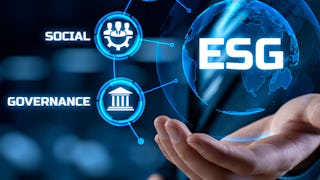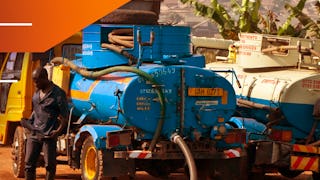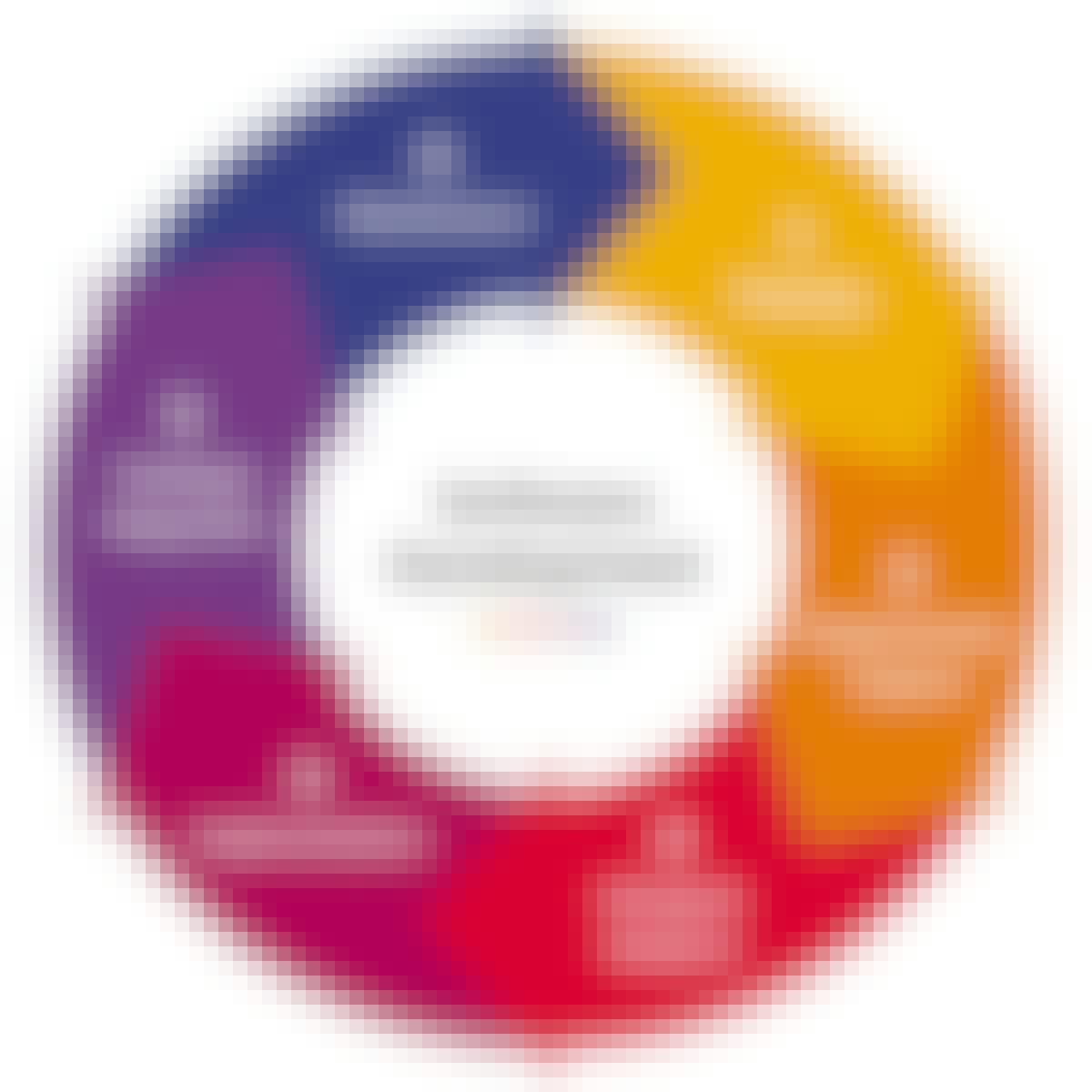- Browse
- Environmental Economics
Results for "environmental economics"
 Status: PreviewPreviewU
Status: PreviewPreviewUUniversity at Buffalo
Skills you'll gain: Building Design, Sustainable Technologies, Sustainable Development, Energy and Utilities, Electrical Power, Sustainable Architecture, Sustainable Engineering, Workforce Planning, Gap Analysis, Climate Change Mitigation, Training Programs, Emerging Technologies, Professional Networking, Semiconductors
4.7·Rating, 4.7 out of 5 stars227 reviewsBeginner · Course · 1 - 3 Months
 Status: PreviewPreviewE
Status: PreviewPreviewEESSEC Business School
Skills you'll gain: Business Transformation, Business Modeling, Social Impact, Strategic Partnership, Organizational Change, Resource Management, Sustainable Business, Innovation, Economics, Public Policies, Human Resources
4.6·Rating, 4.6 out of 5 stars21 reviewsBeginner · Course · 1 - 4 Weeks
 Status: PreviewPreviewU
Status: PreviewPreviewUUniversidad de Palermo
Skills you'll gain: Corporate Sustainability, Business Ethics, Environmental Social And Corporate Governance (ESG), Sustainability Reporting, Sustainable Development, Business Strategy, Business Reporting, Corporate Communications, Annual Reports, Customer Relationship Building, Environment and Resource Management, Accountability, Stakeholder Engagement
4.7·Rating, 4.7 out of 5 stars301 reviewsBeginner · Course · 1 - 4 Weeks
 Status: Free TrialFree TrialJ
Status: Free TrialFree TrialJJohns Hopkins University
Skills you'll gain: Social Network Analysis, Network Analysis, Responsible AI, Graph Theory, Machine Learning, Applied Machine Learning, Research, Model Evaluation, Social Sciences, Statistical Analysis, Amazon Web Services, R Programming, Tensorflow, Data Ethics, Artificial Intelligence and Machine Learning (AI/ML), Research Design, Sociology, Driving engagement, Machine Learning Methods, Behavioral Economics
4.3·Rating, 4.3 out of 5 stars12 reviewsIntermediate · Specialization · 3 - 6 Months
 Status: Free TrialFree TrialL
Status: Free TrialFree TrialLLondon Business School
Skills you'll gain: Corporate Sustainability, Environmental Social And Corporate Governance (ESG), Sustainable Business, Digital Transformation, Resilience, Sustainable Development, Operational Risk, Leadership Development, Business Transformation, Business Continuity, Team Motivation, Corporate Strategy, AI Enablement, Business Ethics, Artificial Intelligence and Machine Learning (AI/ML), Organizational Change, Technology Strategies, Leadership Studies, Organizational Leadership, Machine Learning
4.7·Rating, 4.7 out of 5 stars206 reviewsIntermediate · Specialization · 3 - 6 Months
 Status: FreeFreeÉ
Status: FreeFreeÉÉcole Polytechnique Fédérale de Lausanne
Skills you'll gain: Sanitation, Environmental Engineering, Water Resource Management, Sustainable Engineering, Sustainable Technologies, Public Health, Cost Estimation, Data Collection, Case Studies
4.8·Rating, 4.8 out of 5 stars675 reviewsIntermediate · Course · 1 - 3 Months
 Status: Free TrialFree TrialUS
Status: Free TrialFree TrialUSMultiple educators
Skills you'll gain: Sustainable Design, Corporate Sustainability, Environmental Social And Corporate Governance (ESG), Sustainable Business, Sustainability Reporting, Sustainable Engineering, Sustainable Development, Business Ethics, Sustainability Standards, Sustainable Systems, Operations Management, Supply Chain Management, Supply Chain Planning, Supply Chain, Manufacturing Operations, Strategic Sourcing, Supply Chain Systems, Procurement, Supplier Relationship Management, Product Design
Build toward a degree
4.7·Rating, 4.7 out of 5 stars32 reviewsBeginner · Specialization · 1 - 3 Months
 Status: Free TrialFree TrialT
Status: Free TrialFree TrialTThe Hong Kong University of Science and Technology
Skills you'll gain: Software Design Patterns, Requirements Analysis, White-Box Testing, Software Architecture, Acceptance Testing, Software Development Methodologies, Unified Modeling Language, Software Development Life Cycle, Configuration Management, Debugging, Software Design, Process Driven Development, Software Engineering, Software Testing, Object Oriented Design, Functional Requirement, Data Modeling, Systems Design, Project Management, Project Planning
4.6·Rating, 4.6 out of 5 stars604 reviewsIntermediate · Specialization · 3 - 6 Months
 Status: Free TrialFree TrialM
Status: Free TrialFree TrialMMacquarie University
Skills you'll gain: Business Ethics, Corporate Sustainability, Sustainable Business, Environmental Social And Corporate Governance (ESG), Sustainable Development, Governance, Corporate Strategy, Business Strategies, Supply Chain, Social Impact, Organizational Structure
4.7·Rating, 4.7 out of 5 stars463 reviewsBeginner · Course · 1 - 3 Months
 Status: PreviewPreviewU
Status: PreviewPreviewUUniversiteit Leiden
Skills you'll gain: Risk Management, Business Risk Management, Operational Risk, Risk Analysis, Safety and Security, Environmental Issue, Cyber Security Strategy, Decision Making, Public Health
4.7·Rating, 4.7 out of 5 stars227 reviewsBeginner · Course · 1 - 3 Months
 Status: PreviewPreviewU
Status: PreviewPreviewUUniversity of Colorado Boulder
Skills you'll gain: Natural Resource Management, Environmental Science, Case Studies, Environment, Environmental Issue, Risk Analysis, Biology, Sustainable Development, Taxonomy
4.5·Rating, 4.5 out of 5 stars45 reviewsBeginner · Course · 1 - 3 Months
 Status: PreviewPreviewU
Status: PreviewPreviewUUniversity of Geneva
Skills you'll gain: Infectious Diseases, Epidemiology, Environment, Social Determinants Of Health, Sustainable Development, Public Health, Environment Health And Safety, Health Policy, Nutrition and Diet, Data Collection
4.7·Rating, 4.7 out of 5 stars364 reviewsIntermediate · Course · 1 - 3 Months
Searches related to environmental economics
In summary, here are 10 of our most popular environmental economics courses
- Renewable Energy: Fundamentals and Job Opportunities: University at Buffalo
- Nouveaux modèles économiques des associations: ESSEC Business School
- Ética y Gobierno Corporativo: Universidad de Palermo
- Social Computing: Johns Hopkins University
- Future Ready Company: London Business School
- Introduction to Faecal Sludge Management: École Polytechnique Fédérale de Lausanne
- Sustainable and Resilient Operations and Supply Chains: University of Colorado Boulder
- Software Engineering: The Hong Kong University of Science and Technology
- Global sustainability and corporate social responsibility: Be sustainable: Macquarie University
- Risk in Modern Society : Universiteit Leiden










